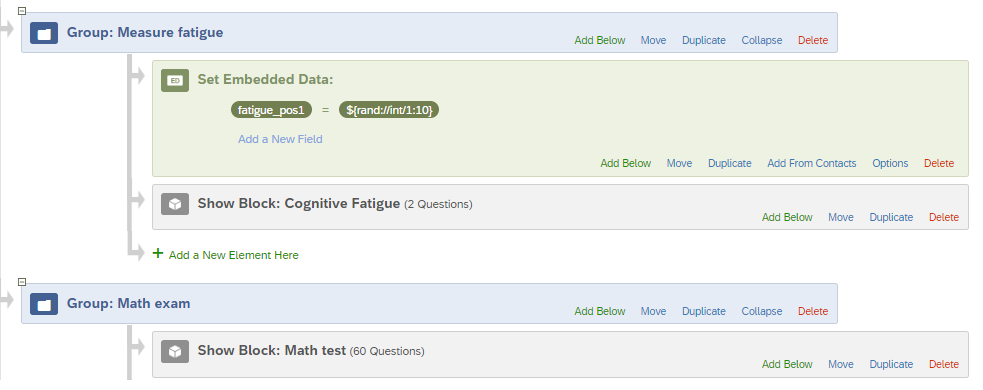Hello,
I am studying the role of fatigue in standardized testing.
My survey has two parts: First I ask participants some questions, including how tired they currently are and how tired they think they will be after answering N math exam questions (where N is a random integer between 1 and 10, stored as embedded data).
The second part is a 20-question math exam. As of now, the whole exam is in one block. Crucially, the order of the exam questions is randomized within the math block.
This is what the flow looks like: And here is the math randomization:
And here is the math randomization:
I want to ask participants how fatigued again once they respond to N of the math questions (the same N as before). The tricky part is that the math questions are displayed in a random order, so a priori I don't know which question will be the Nth one.
Based on responses to similar questions in this forum (specifically, this one), I believe that there is a way to do this using blocks. I can create one block for each math question, store a counter as embedded data that accumulates after each block, and show the fatigue question once the counter is equal to "N+1".
What I would like to know is if there is a way to do this without creating a block for each math question (i.e., keeping all math questions in one block).
Thanks!
Displaying a question after respondent answered a random number of questions
Sign up
Already have an account? Login

Welcome! To join the Qualtrics Experience Community, log in with your existing Qualtrics credentials below.
Confirm your username, share a bit about yourself, Once your account has been approved by our admins then you're ready to explore and connect .
Free trial account? No problem. Log in with your trial credentials to join.
No free trial account? No problem! Register here
Already a member? Hi and welcome back! We're glad you're here 🙂
You will see the Qualtrics login page briefly before being taken to the Experience Community
Login with Qualtrics

Welcome! To join the Qualtrics Experience Community, log in with your existing Qualtrics credentials below.
Confirm your username, share a bit about yourself, Once your account has been approved by our admins then you're ready to explore and connect .
Free trial account? No problem. Log in with your trial credentials to join. No free trial account? No problem! Register here
Already a member? Hi and welcome back! We're glad you're here 🙂
You will see the Qualtrics login page briefly before being taken to the Experience Community
Login to the Community

Welcome! To join the Qualtrics Experience Community, log in with your existing Qualtrics credentials below.
Confirm your username, share a bit about yourself, Once your account has been approved by our admins then you're ready to explore and connect .
Free trial account? No problem. Log in with your trial credentials to join.
No free trial account? No problem! Register here
Already a member? Hi and welcome back! We're glad you're here 🙂
You will see the Qualtrics login page briefly before being taken to the Experience Community
Login with Qualtrics

Welcome! To join the Qualtrics Experience Community, log in with your existing Qualtrics credentials below.
Confirm your username, share a bit about yourself, Once your account has been approved by our admins then you're ready to explore and connect .
Free trial account? No problem. Log in with your trial credentials to join. No free trial account? No problem! Register here
Already a member? Hi and welcome back! We're glad you're here 🙂
You will see the Qualtrics login page briefly before being taken to the Experience Community
Enter your E-mail address. We'll send you an e-mail with instructions to reset your password.



